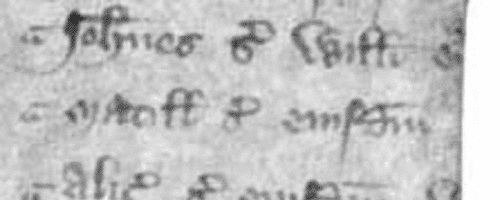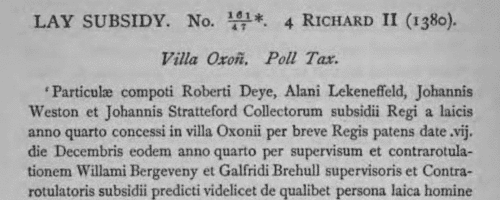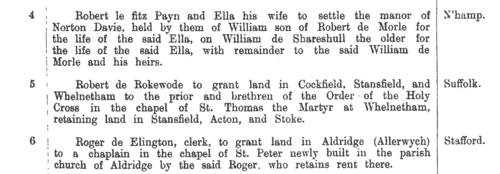Iryssh Surname Ancestry ResultsOur indexes 1000-1999 include entries for the spelling 'iryssh'. In the period you have requested, we have the following 5 records (displaying 1 to 5):
Buy all | |
| Get all 5 records to view, to save and print for £24.00 |
These sample scans are from the original record. You will get scans of the full pages or articles where the surname you searched for has been found.
Your web browser may prevent the sample windows from opening; in this case please change your browser settings to allow pop-up windows from this site.
Inhabitants of London
(1337-1352)
Letter Book F of the City of London contains enrolments of recognizances between inhabitants, particularly citizens, for sums of money lent or due; grants of pieces of land or property; and various records relating to the city administration, minor infractions, &c. The book includes an assessment of the inhabitants in 1346 (pages 143 to 149) listing many householders; a list of mayors and sheriffs from 1189 to 1548 (276-303), and records of the city's use of infangthef (summary execution of certain criminals) down to 1409. The text was edited by Reginald R. Sharpe and printed by order of the Corporation of the City of London in 1904.
IRYSSH. Cost: £4.00.  | Sample scan, click to enlarge

|
 Inhabitants of Turvey in Bedfordshire
(1379) Inhabitants of Turvey in Bedfordshire
(1379)
The poll tax granted in 1379 was assessed and raised in the following two years. Every lay person, man or woman, aged over 15 was to be taxed. This undated return from the National Archives (E 179/71/41) consists of two parchment strips listing payers of a subsidy of that period from hundreds in Bedfordshire. The two strips are duplicates: but both are largely missing the right hand side, with the sums assessed, and often, alas, even the surnames. The term "s'" which appears frequently in the lists means 'serviens', i. e. servant. This index covers the names from the section for Turvey.IRYSSH. Cost: £8.00.  | Sample scan, click to enlarge

|
Inhabitants of the city of Oxford
(1380)
The poll tax granted in 1379 was assessed and raised in the following two years. Every lay person, man or woman, aged over 15 was to be taxed. The returns for the city of Oxford, edited by J. E. Thorold Rogers, were printed for the Oxford Historical Society in 1891.IRYSSH. Cost: £4.00.  | Sample scan, click to enlarge

|
Grantees of offices, commissions and pardons
(1413-1416)
The Patent Rolls are the Chancery enrolments of royal letters patent. Those for the 1st, 2nd and 3rd years of the reign of king Henry V (21 March 1413 to 20 March 1416) were edited for the Public Record Office by R. C. Fowler, and published in 1910. The main contents are royal commissions and grants; ratifications of ecclesiastical estates; writs of aid to royal servants and purveyors; and pardons. The commissions of the peace issued for the English towns and counties and entered on the rolls, being largely repetitive, have been consolidated in a single appendix.IRYSSH. Cost: £2.00.  | Sample scan, click to enlarge

|
Landowners and tenants in Somerset
(1345-1485)
Inquisitions ad quod damnum were held by the appropriate sheriff or escheator (or other officer in whose bailiwick the matter in question might lie) to investigate cases in which the royal or public interest might be damaged by proposed alienation or settlement of land (especially alienation to religious uses, into mortmain). The key findings from these inquisitions were as to the tenure of the land and the service due from it; its yearly value; the lands remaining to the grantor, and whether they sufficed to discharge all duties and customs due from him; and whether he can still be put upon juries, assizes and recognitions, so that the country be not burdened by his withdrawal from them. Generally speaking, this process had the makings of a system of licensing such alienations, and raising money in proportion to the valuations. Equally, there are many items that deal with subjects such as the closing of public roads, the felling or inclosing of woods, or the proposed grant of liberties or immunities. A calendar of these inquisitions from the 19th year of the reign of king Edward III to the 2nd year of Richard III was prepared by the Public Record Office and published in 1906. We have now indexed this calendar by surname and county. Most of the individuals appearing in the calendar are either pious individuals seeking to make grants to religious bodies for the sake of their souls; or landowners securing the disposition and settling of their real estate. But some other names do appear - tenants, trustees, chaplains and clerks.IRYSSH. Cost: £6.00.  | Sample scan, click to enlarge

|
Research your ancestry, family history, genealogy and one-name study by direct access to original records and archives indexed by surname.








